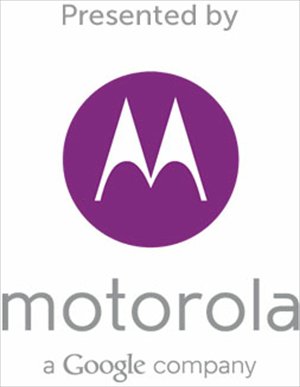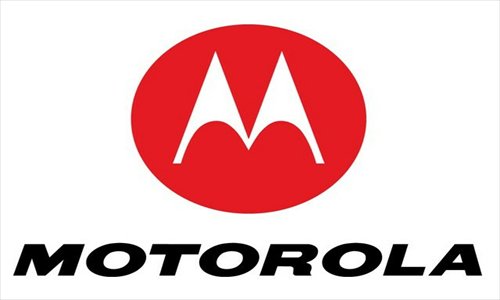HOME >> SCI-TECH
‘Goodbye Moto’ and ‘hello Google company’
By Li Qiaoyi Source:Global Times Published: 2013-7-5 5:03:05

The logo Motorola Mobility recently introduced on Chicago's Techweek website

Motorola's traditional logo
A year after Google Inc has completed its acquisition of Motorola Mobility, the cell phone division spun off from Motorola - the US company that invented the first mobile phone and used it to lead the pack with its catchy "Hello Moto" ads - revealed a newly branded logo in Chicago last month that appears to have left Chinese consumers with a feeling of nostalgia.
On June 26, the day before Chicago's technology conference Techweek opened, Motorola Mobility, one of the main sponsors of the event, showcased the hybrid design on Techweek's website.
And while the signature "M" has been retained, the new tagline that reads, "Motorola, a Google company," has been lamented by fans, one of whom, under the handle SolomonWei, wrote on his Sina Weibo on June 27, that "both Google and Moto are my beloved brands, but a combination of the two is still a little bit weird, and somewhat sad."
Analysts, meanwhile, have been left wondering what the change means for not only Motorla Mobility, but also the future of the faded mobile phone empire, Motorola.
Motorola Mobility's new Google-stamped logo is indeed a bit of "sad news for the once mobile phone giant," Bryan Wang, vice president and principal analyst at Forrester Research, told the Global Times on Wednesday.
New ad campaign
But some tech enthusiasts say that it's not all tears as the new branding represents the start of another chapter for Motorola Mobility.
With ads in the July 3 editions of a number of influential media outlets in the US, including The New York Times, USA Today, The Wall Street Journal and Washington Post, Motorola Mobility is set to embark on a new journey with its new Moto X smartphone, a feature in the New York-based magazine Ad Age said on Tuesday. The new gadget, said to be an entirely customizable phone to cater to individual interests, is likely to be unveiled on August 1.
According to the magazine, the new ad emphasizing American patriotism in a way that touts the new gadget as the "first smartphone designed, engineered and assembled in the USA," demonstrates Motorola's ambition to change, albeit in an old-fashioned manner.
"What better time than July 4th to come with a message like that?" Brian Wallace, Motorola Mobility's vice president of global brand and product marketing, was cited by the magazine.
As for more on what the changes mean for Chinese consumers, it appears that they will have to wait and see.
"Motorola Mobility China won't make any announcements regarding the re-branding campaign or the new gadget for the moment," a source close to Motorola Mobility's China operations, who preferred to not be identified, told the Global Times on Wednesday.
Speculating, however, CK Lu, a Taipei-based senior analyst of mobile devices at research firm Gartner Inc, told the Global Times on Wednesday, acknowledged that while the campaign may help beef up market sentiment on the brand in its home market, it will be "hard to expect any boost from the company's re-branding efforts to be given to its performance in the Asia-Pacific region, especially the highly competitive Chinese market."
Even top smartphone makers Samsung and Apple have been suffering from rising rivalry from Chinese handset makers in the market, Lu pointed out, down-playing optimism in the forecasts of a comeback from the Motorola brand, once most-famous in China's market.
Increasingly stiff competition
During the first quarter of the year, mobile phone shipments in China's market rose by 15 percent to 97 million units compared to a year earlier, while shipments of smartphones in the market soared 117 percent year-on-year during the same period to total 78 million units. The figures showed continued momentum in market growth for the world's second largest economy, according to figures released in mid-June by US consultancy firm International Data Corporation (IDC).
"In China's smartphone market, Samsung has switched its marketing focus from competing with Apple for high-end market to maintaining its high-end market share, and is starting to strive for market for products under $200, which has so far been dominated by domestic brands," Antonio Wang, associate director of computing systems research group of IDC China, said in a statement announcing the data.
Such data has left Gartner's Lu questioning how Motorola would be able to "claim a comeback in such an intensely competitive market with its sales force almost axed."
Motorola Mobility has been mired in layoff rumors since last year, and Chinese media reports said in late May that the company was planning a second round of layoffs in the near future, after which, its China operation would consist of no more than 200 employees with almost all of its regional sales troops being laid off.
Industry watchers mused that Motorola Mobility's next move will most likely be engineered by Google in an attempt to shore up business for Google's mobile operating system rather than revitalize Motorola's brand with the intent to flood the market with Motorola smartphones.
"With the new phone, Google is likely to promote the latest updates of its own platform," said Lu, who believes the new device will be a best test phone for Google's latest improvements to the Android platform.
Forrester's Wang agreed, saying that he had earlier wrongly predicted that Google would acquire Motorola's cell phone division to develop its own hardware business, in a similar move to Microsoft touting its Surface tablet hardware venture.
Rather Google has been betting on its acquisition of Motorola Mobility "mainly to hedge pressure from intellectual property lawsuits from its rivals," he said.
Meanwhile, rumors about Motorola's supposed "Goodbye Moto" ad for the Moto X launch labeled as "pitch work" for Motorola on behance.net, a website featuring creative works by professionals across industries, may further complicate market sentiment.
One of the images on the site posted by engineer B.A. Bäkken reads, "We're not good at goodbyes. No one is. They're hard. And sad. But the time has come. ...Farewell to the Motorola that has shaped today."
Posted in: Feature